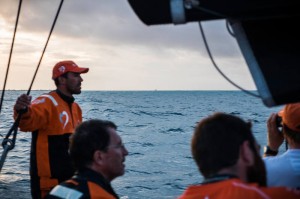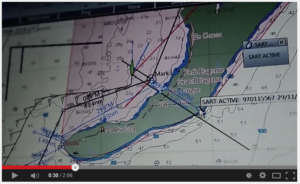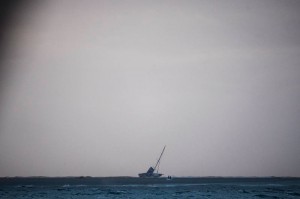
Team Vestas Wind, grounded at far left in picture, surrounded by the reef and islets. Amory Ross photos courtesy of Volvo Ocean Race.
Team Vestas Wind, one of the seven boats competing in the Volvo Ocean Race, ran up on a reef near Mauritius in the Indian Ocean. The crew are all uninjured and are being transported to Mauritius, but the boat suffered tremendous damage. It hit the reef at about 18 knots at night.
The big question on everybody’s mind, and one that has no answers yet, is how could this happen. The reef is well known and charted, the crew including navigator Wouter Verbraak and skipper Chris Nicholson, are experienced and well respected. Speculation surrounds how the the electronic charts were being used. A couple of telling comments from sailors on other boats indicate that mis-using the charting software could have made the reef invisible on the chart, or at least difficult to see. Yann Riou, onboard reporter for Dong Feng, wrote “Charles (skipper) had noticed this archipelago a few days ago.
But it’s worth noting that it’s actually pretty hard to find. In fact, to see it on our electronic charts, you have to zoom right in on top of it. But how and why would you zoom into it if you don’t know it’s there in the first place?” Abu Dhabi skipper Ian Walker similarly said “When we went past them (the reefs) we actually said how easy it would be to hit at night. Fortunately we went through in daylight. There are different layers of charting, so it’s very difficult to see on the electronic charts.”
It will be very interesting to hear the details of how the accident happened. For now the focus is on getting Vestas off the reef with as little damage to the environment as possible. (Sponsor Vestas is a wind-generator maker with environmental conservations as a core message).
Here is some of the media coverage from Volvo on the accident.
Synopsis:
All nine members of the Danish team were uninjured in the drama, which unfolded from 1510 UTC on Saturday when their Volvo Ocean 65 hit the reef in Cargados Carajos Shoals, Mauritius.
For several hours, the crew stayed onboard their stricken vessel whose stern was being beaten badly by the waves as it was stuck fast in the reef with the bow facing the ocean.
The rudders were broken in the collision and the stern began taking on water – although the stern compartment was locked tight.
Finally, at around midnight, the team led by skipper Chris Nicholson abandoned the boat and then waded, knee-deep through the sea to a dry spot on the reef from where they could be rescued by a coastguard RIB at daybreak at around 0230 UTC.
They were transported to the tiny islet of Íle du Sud, part of Cargados Carajos Shoals, which is also known as St. Brandon and situated some 430 kilometres to the north-east of Mauritius.
Race organisers and Team Vestas Wind will now attempt to take them from there to the mainland. Race Control in Alicante, Spain kept the Maritime Rescue Co-Operation Centre (MRCC) informed throughout the incident.
Team Vestas Wind’s rival race crew, Team Alvimedica, diverted to assist in a rescue mission if necessary but after several hours looking on from a safe distance away, were eventually cleared to continue racing north after it was apparent that the Vestas crew were no longer in danger.
Navigator Will Oxley sent this report from Team Alvimedica: “All is well on board, though it is fair to say we are all shattered and quite emotional about what happened.
The Danish team’s concern now will be a salvage mission for their boat but it was not immediately clear how much damage the incident had caused.
Knut Frostad, Volvo Ocean Race CEO, said it was also not yet known why Nicholson’s crew had hit the reef, but this would be examined in due course.
“I’m extremely relieved that every one of the nine crew members now are safe and that nobody is injured,” he said.
“That has always been our first priority since we first learned about the grounding.
“At the same time, I’m deeply saddened that this happened to Team Vestas Wind and Chris Nicholson and his team. It’s devastating for the team, for the race and for everyone involved.”
The Danish team was the seventh, and last, to enter this race, joining the fleet just weeks before the start line – but skipper Chris put together an experienced and enthusiastic team which secured fourth place in the first leg, Alicante to Cape Town.
“The safety and wellbeing of the crew has been our only concern during these difficult hours,” said Morten Albaek, CEO of Vestas Wind Ocean Racing.
“We are extremely grateful to the team at Volvo Ocean Race and to Alvimedica for their support and outstanding professionalism during the rescue operations. The extent of the damage to the boat will be evaluated and dealt with from here on.”
Video of Team Alvimedica standing by and of “coast guard” vessel coming to assistance:
Interview of Team Vestas skipper Chris Nicholson:
Alvimedica navigator Will Oxley monitoring situation and helping coordinate rescure:


